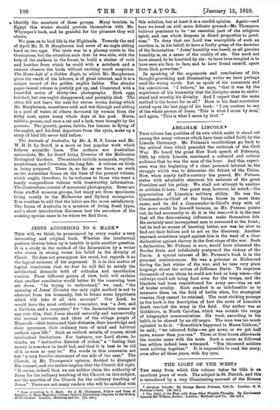JESUS ACCORDING- TO S. MARK.•
Tars will, we think, be pronounced by every reader a very interesting and original book. Whether the intellectual position therein taken up is tenable is quite another question. It is a study in the method of the Incarnation by a writer who states in strong terms his belief in the divinity of Christ. He does not presuppose his creed, but regards it as the logical outcome of his argument. It is in this matter of logical conclusion that we fear he will fail to satisfy the intellectual demands both of orthodox and unorthodox readers. From different points of view, both will exclaim that another conclusion would better fit the reasoning here set down. "In trying to understand," we read, "the meaning of Jesus' Divinity the only right method is not to abstract from his humanity, but to frame some hypothesis which will take it all into account." Our Lord, he would have the most orthodox remember, was "a Jew, and a Galilean, and a carpenter," for "the Incarnation means at any rate -this, that Jesus shared naturally and unreservedly the normal interests and ideas of the village people of Nazareth—their tastes and their distastes, their knowledge and their ignorance, their ordinary turn of mind and habitual outlook upon life." Such an outlook entails, of course, strict intellectual limitations. For instance, our Lord shows, he thinks, an " instinctive distrust of riches," a " feeling that money is somehow in itself bad, and that it is best to be rid of it as soon as may be." His words in this connexion are but " a very forcible statement of one side of the case." The Church, in Mr. Thompson's opinion, decided to disregard His counsel, and our author implies that the Church did right. " It seems, indeed, that we can neither claim the authority of Jesus for the ordinary teaching of the Church on this subject, nor the sanction of the Church for the ordinary teaching of Jesus." There are not many readers who will be satisfied with • Jesus according to S. Mark. By J. M. Thompson, Fellow and Dean of Divinity, S. Mary Magdalen College. Oxford, Examining Chaplain to the Bishop of Gloucester. London: Methuen and Co. [5a. net.]
this solution, but at least it is a candid opinion. Again—and here we tread on still more delicate ground—Mr. Thompson believes penitence to be " an essential part of the religious spirit, and one which deepens in direct proportion to good- ness." To deny that our Lord was susceptible of such an emotion is, in his belief, to have a faulty grasp of the doctrine of the Incarnation. " Jesus' humility was based, as all genuine humility is, on a sense of the reality of sin. One need not have sinned, to be humbled by sin: to have been tempted is to have seen sin face to face, and to have found oneself, apart from God, powerless."
In speaking of the arguments and conclusions of this thought-provoking and illuminating writer we have perhaps used the wrong words. Let us speak of his comments and his convictions. "I believe," he says, " that it was by the experience of his humanity that the disciples came to under- stand and worship his divinity. And I expect that the same method is the truest for us all." Here is his final conviction stated upon the last page of his book " I am content to say of the whole person of Jesus, 'This is what I mean by man,' and again, 'This is what I mean by God.' "






































 Previous page
Previous page